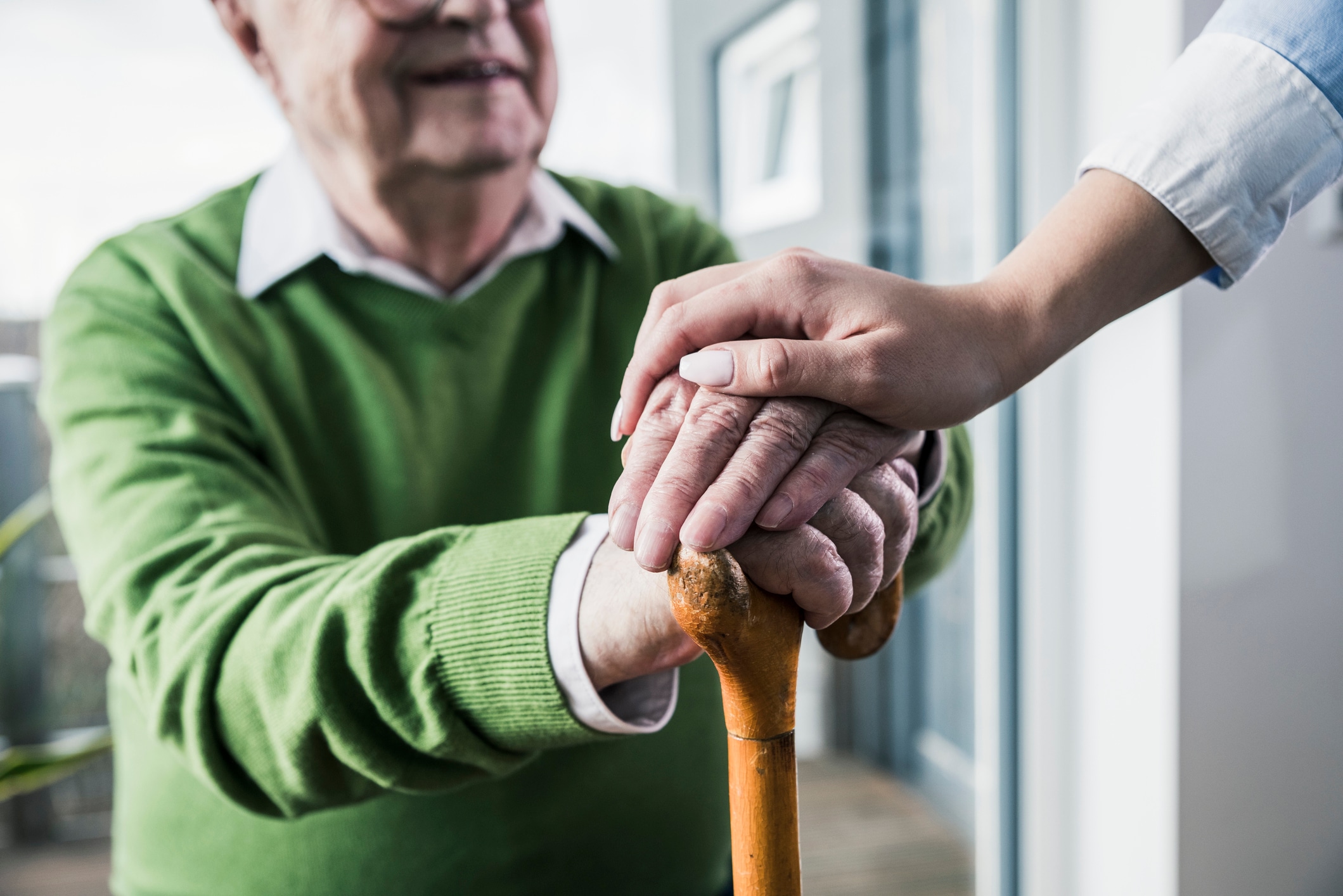In this article
- Certified nursing assistant vs. home health aide: what’s the difference?
- Responsibilities of a certified nursing assistant vs. home health aide
- What is the cost difference between hiring a certified nursing assistant and a home health aide?
- How to choose between a certified nursing assistant and home health aide for your loved one
- The bottom line
Hiring a certified nursing assistant (CNA) or a home health aide (HHA) to help care for a senior on a daily basis is a big decision. But from ensuring your loved ones safety to providing medical assistance, the benefits can be even bigger — as long as you match their caregiving specialties with your particular needs.
“Some of the biggest reasons for considering in-home professional help include when the older adult has difficulty performing everyday activities on their own, such as bathing, eating, using the bathroom and moving around the home safely,” explains Michelle A. McKay, a registered nurse specializing in geriatrics and assistant professor at M. Louise Fitzpatrick College of Nursing at Villanova University. “Other reasons, such as loneliness, difficulty cooking, confusion or an increased risk for injury due to falling, may also warrant the help of an in-home professional.”
So what can a CNA do for seniors compared to an HHA? Here, experts explain the key differences between home health aides and nursing assistants — including training requirements, responsibilities and costs — plus offer tips for making the best choice depending on specific senior needs.
Certified nursing assistant vs. home health aide: what’s the difference?
While there are commonalities between these two in-home caregiving roles, there is one key difference: “Both home health aides and certified nursing assistants receive formal training in providing support and care to others,” McKay explains. “However, CNAs are trained and certified to provide some medical assistance.”
Training required for certified nursing assistants
The training required to become a certified nursing assistant enables CNAs to perform direct patient care under the supervision of a registered nurse (RN), explains Stacey Anderson, a registered nurse based in Novi, Michigan who has over 40 years of experience and has specialized in senior care for the last two decades. They must obtain a certification through a licensed institution, many of which are hospitals, schools or organizations like the American Red Cross.
“CNAs train and then work under the direction of a registered nurse which is why most nursing assistants don’t do in-home care, but rather work in a facility or hospital,” Anderson says. For CNAs who choose to do in-home care, they still report to an RN who then often reports to a physician overseeing a senior’s care, she notes.
Find a nursing assistant
Training required for home health aides
Home health aides, on the other hand, most often receive home healthcare training through independent agencies to prepare for their role. They subsequently will report directly to the family member who hires them. “Although HHAs can be certified, it varies by state whether a certification is required,” McKay explains. Certified HHAs complete a program that is often in a clinical setting to increase their skill set and marketability.
“As a home care aide, most of the training revolves around basic safety,” explains Kylie Meyer, an assistant professor at the Frances Payne Bolton School of Nursing at Case Western Reserve University who also worked as an in-home caregiver prior to obtaining her doctorate in gerontology. “I was often going into someone’s home and learning through experience about how to connect with a patient and meet their unique needs.”
Find a home health aide
Responsibilities of a certified nursing assistant vs. home health aide
Both CNAs and home health aides can assist with activities of daily living (ADLs), which is a medical term for the basic tasks people do to care for themselves, explains Anderson. These tasks include:
- Bathing.
- Eating.
- Dressing.
- Grooming and oral care.
- Using the restroom.
- Supervising medication schedules.
Due to the differences in training requirements, however, the responsibilities of a CNA vs. a home health aide vary. Specific CNA requirements differ by state so experts advise to always check the regulations in place in your area. But, in general, these are the extra tasks certified nursing assistants and home health aides are are capable of performing:
Certified nursing assistant-specific responsibilities
- Monitor vital signs.
- Administer medications under the supervision of an RN.
- External catheter care.
- Minor wound care.
- Lift operation.
- Ventilator operation.
- Transfer patients in and out of a bed, chair or wheelchair.
Home health aide-specific responsibilities
- Shop for groceries.
- Run errands.
- Make snacks.
- Care for pets.
- Provide social interaction.
- Plan social activities and transportation.
- Clean and organize living areas.
What is the cost difference between hiring a certified nursing assistant and a home health aide?
Home health aides employed by a caregiving agency typically charge around $30 per hour, according to Anderson, while aides who work independently may charge between $20 to $25 an hour. “But keep in mind that when you’re working with a company, there is insurance,” Anderson says. “With private or independent caregivers, you may have more consistency, but none of it is covered under insurance.”
Due to their certification, oftentimes the cost may be a bit higher for a CNA, explains chief executive officer of JFS Care Steven Barlam, a certified care manager and licensed clinical social worker based in Los Angeles. “This could be $1-4 more per hour,” he says.
But in either situation, the costs you’ll ultimately end up paying will depend on your insurance coverage and your state, McKay explains. She recommends consulting with your insurance company first to determine if hiring a CNA or HHA is covered. She also suggests reaching out to local caregiving organizations for information on services that may be covered by insurance in your area.
How to choose between a certified nursing assistant and home health aide for your loved one
Experts agree that for seniors who need medical monitoring, management or more physical assistance, a CNA may be a more appropriate choice for in-home care. A CNA would also be ideal for someone who has recently been discharged from the hospital and continues to require diligent follow-up and observation, Barlam notes.
With medical needs accounted for, experts emphasize working together to determine what type of caregiver is right for your situation. “The decision to hire in-home help is best made with input from the senior and those closest to them, whether family or friends,” McKay says. Here are more tips for choosing between a CNA or HHA:
Make a detailed list of activities that require assistance
To start, McKay and Anderson both recommend that caregivers list out not only every activity requiring support, but also how often they occur — daily, a few times a week or once a week — and what time of day extra help would be most beneficial, whether it be morning, middle of the day or for the entire day. This will help identify the type of assistance needed and help you narrow down which is best suited to provide it.
Consult with the senior’s physician
With your list documented, McKay suggests speaking with your medical provider to determine whether a CNA or home health aide can offer the best assistance for your family member. “Local, state and government organizations can also provide information about services that would be most helpful,” she says.
Enlist the help of an aging life care manager
Looking for more guidance? “There is great value in engaging with an aging life care professional,” Barlam says. “Depending on what the needs are, what is important to the client and the risk factors at play, the aging life care professional can make the appropriate recommendation so that the family can get the right care in place effectively and efficiently.”
The bottom line
Both certified nursing assistants (CNAs) and home health aides (HHAs) are trained to provide expert in-home care for seniors, but the tasks they can perform are different.
In general, HHAs can assist with nonmedical needs such as personal care and light housekeeping activities, McKay explains. CNAs can provide the same support as HHAs, but they are also certified to provide certain medical assistance, making them the recommended in-home caregiver choice among experts for seniors who require direct patient care, such as administering medications or monitoring vital signs.
To decide whether a CNA or home health aide is best for your situation, the biggest thing to consider is what activities require assistance for an older adult, according to the experts. Make a list together of activities your loved one needs help with, then refer to their physician or an aging life care manager to determine who can best help.





